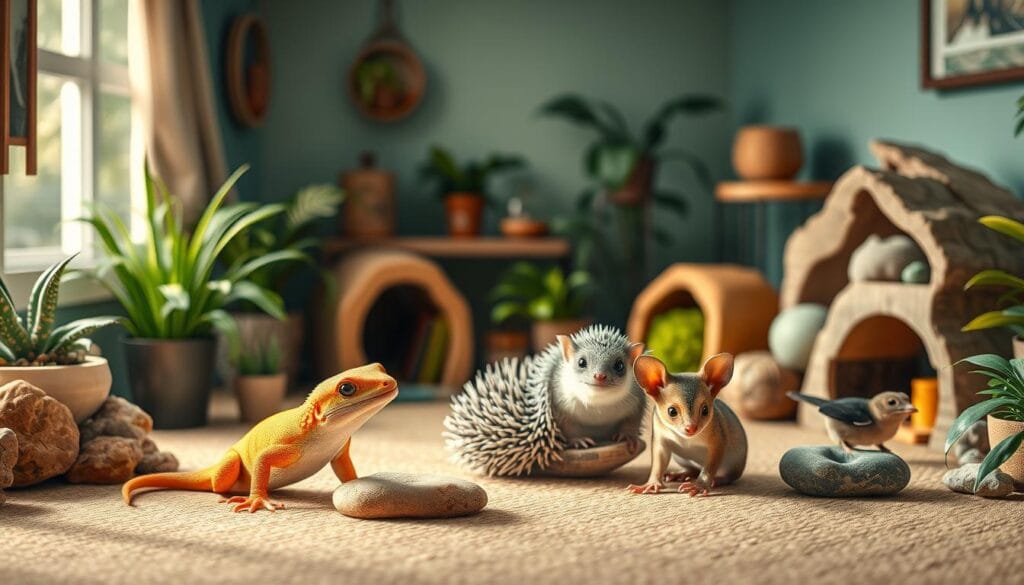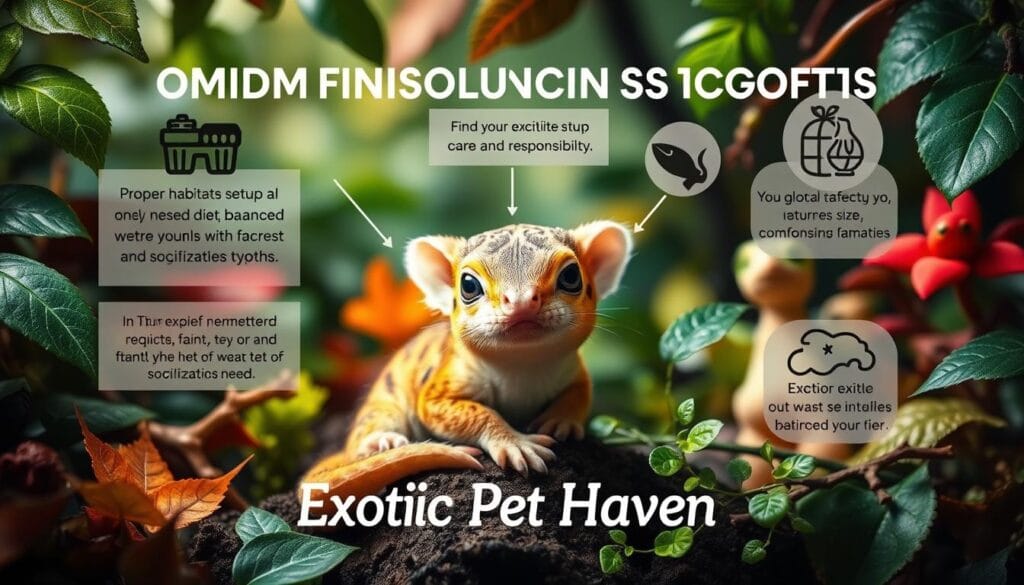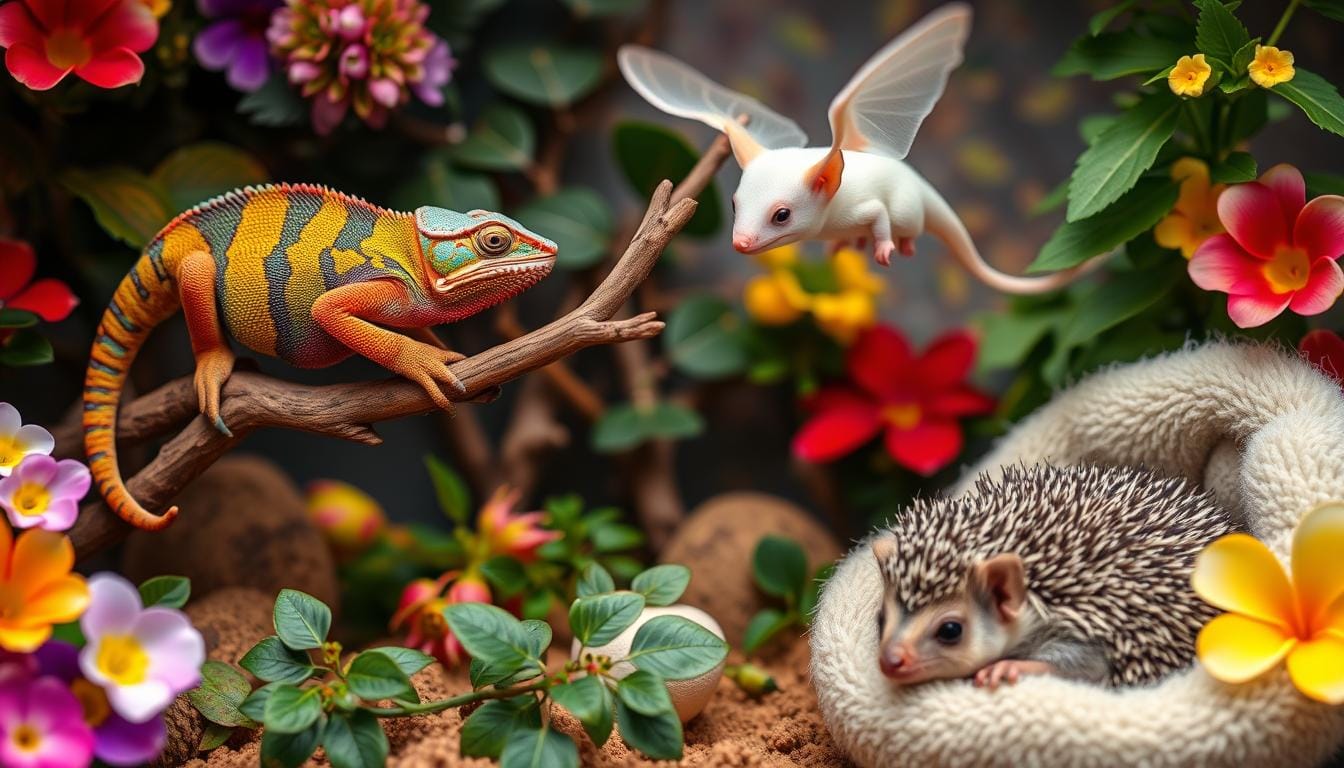Ever felt like traditional pets don’t fit your lifestyle? Welcome to the world of small exotic animals as pets. Imagine coming home to a unique companion, unlike the usual cat or dog.
These pets are perfect for apartment dwellers and those looking for something different. From tiny hedgehogs to cute leopard geckos, caring for them is both fun and easy.
There are about 50 rabbit breeds and many other small exotic animals ready to win your heart. They’re great for small spaces or anyone wanting a low-care pet. These small wonders can make your home special.
Table of Contents
Understanding Exotic Pets: What Defines Them?
Exotic pet ownership is a growing trend among animal lovers. They seek companions that are different from the usual pets. These unique animals challenge our ideas of what makes a great pet.
The world of exotic pets is both complex and exciting. In the United States, exotic animals are defined as non-native species. This makes them a special category of pets, different from the common household pets.
Characteristics of Small Exotic Animals
Small exotic animals have some key traits:
- They look different from regular pets
- They need special care
- They have unique behaviors
- They require specific habitats
Popularity and Trends in Exotic Pets
The market for exotic pets is growing fast. People want unique pet care experiences. There are many types of exotic pets, including:
- Amphibians (like African clawed frogs)
- Reptiles (such as bearded dragons)
- Small mammals (like sugar gliders)
- Birds (including African grey parrots)
- Arachnids (like tarantulas)
The Appeal of Unique Companionship
“Exotic pets offer a window into extraordinary animal worlds that traditional pets cannot provide.”
It’s important to know the exotic pet regulations for owning them responsibly. Some states have few rules, while others have strict licensing. Before getting an exotic pet, you must check local laws and prepare for the special care they need.
Being ethical is key. Responsible exotic pet ownership means thinking if you can really meet an animal’s complex needs. Always put the pet’s health and natural behaviors first.
Small Exotic Animals That Make Great Pets
Exploring unique exotic pet species reveals fascinating options for animal lovers. These small exotic animals as pets offer distinctive experiences. Each creature brings its own personality and unique pet care requirements.
Passionate pet enthusiasts are discovering delightful alternatives to standard cats and dogs. These miniature companions provide entertainment, companionship, and an opportunity to care for extraordinary creatures.
Hedgehogs: The Prickly But Sweet Companion
Hedgehogs represent an adorable exotic pet species that captivates owners with their quirky personalities. These tiny mammals require specialized care and create unique bonding experiences.
- Quiet and low-maintenance pet
- Minimal allergen production
- Recommended habitat size: 2×3 feet cage
- Nocturnal activity patterns
Sugar Gliders: Lively and Social Creatures
Sugar gliders are remarkable small exotic animals that form deep connections with their human companions. These nocturnal marsupials demand significant social interaction and specialized unique pet care.
- Highly social animal
- Requires consistent human bonding
- Needs specialized diet
- Thrives on companionship
African Pygmy Goats: Miniature Farms at Home
For those with outdoor space, African Pygmy Goats offer an unconventional pet experience. These miniature creatures bring farmyard charm directly into residential environments.
| Species | Size | Lifespan | Care Difficulty |
|---|---|---|---|
| Hedgehog | 6-8 inches | 4-7 years | Moderate |
| Sugar Glider | 5-6 inches | 12-15 years | High |
| African Pygmy Goat | 16-23 inches | 10-15 years | Advanced |
“Exotic pets transform ordinary pet ownership into extraordinary companionship.” – Veterinary Exotic Pet Association
Remember that each exotic pet demands dedicated research, specialized care, and commitment. This ensures their health and happiness.
Benefits of Owning Small Exotic Animals
Exploring exotic pet ownership opens a world of unique companionship. It’s different from traditional pets. Small exotic animals offer remarkable advantages for those seeking an unconventional pet companion.
Low Maintenance Compared to Traditional Pets
Unique pet care becomes simpler with small exotic animals. These pets need less daily attention and space than dogs or cats. Here are some maintenance advantages:
- Minimal grooming requirements
- Smaller living spaces needed
- Lower daily care time commitment
- Reduced veterinary expenses
Unique Personalities and Behaviors
Small exotic animals have delightful and unexpected personality traits. Reptiles like lizards can grow attached to their owners. Parakeets show remarkable intelligence and sociability.
“Exotic pets offer a window into fascinating animal behaviors that traditional pets often cannot match.” – Exotic Pet Enthuasiast
Space Requirements and Adaptability
Urban dwellers and apartment residents find small exotic animals appealing. Their compact habitat needs make them ideal for limited living spaces.
| Exotic Pet Type | Space Requirement | Maintenance Level |
|---|---|---|
| Leopard Gecko | 10-20 gallon tank | Low |
| Hermit Crab | 10-20 gallon enclosure | Very Low |
| Parakeet | Medium-sized cage | Low |
Interesting statistics show that about 6 percent of U.S. households own small exotic animals. Seniors find these pets attractive because they are low-maintenance.
Considerations Before Adopting Exotic Pets
Thinking about getting an exotic pet? It’s a big decision that needs a lot of thought. You’ll need to learn about the laws, how to care for them, and the health risks.

Legal Regulations and Restrictions
Exotic pet laws change a lot from state to state. Here are some important things to know:
- 20 states ban owning non-native species
- 14 states have rules for endangered or dangerous animals
- 15 states need special permits for exotic pets
- Three states – Nevada, Alabama, and North Carolina – have few rules
“Know your local laws before bringing an exotic pet home”
Dietary Needs and Habitats
Every exotic pet is different. For example, bearded dragons need special food. Ball pythons require a certain environment.
| Exotic Pet | Dietary Requirements | Habitat Needs |
|---|---|---|
| Bearded Dragon | Insects, vegetables | Warm terrarium, UVB lighting |
| Ball Python | Whole prey items | Controlled humidity, temperature gradient |
| Hedgehog | Specialized pellets, insects | Warm enclosure, exercise wheel |
Possible Health Risks and Care Challenges
Exotic pets can have health issues. Some pets might carry diseases:
- Reptiles like leopard geckos can spread Salmonella
- Some pets might cause allergies
- They need special vet care
- They can pass diseases to humans
Keeping an exotic pet can be expensive. You’ll need to budget for vet bills, special habitats, and ongoing care. It’s important to plan ahead and learn how to take good care of your pet.
Setting Up a Habitat for Your Exotic Pet
Creating the perfect home for your exotic pet needs careful planning and detail. Exotic pet housing is more complex than traditional pet environments. It demands specialized knowledge and specific equipment.
Essential Supplies for Unique Pet Care
When setting up a habitat for your exotic pet, consider several key components:
- Appropriate enclosure size and material
- Specialized lighting systems
- Temperature regulation equipment
- Substrate and bedding materials
- Enrichment items specific to your pet’s species
Creating a Comfortable Living Space
Each exotic pet needs a unique habitat design. Small mammals like hedgehogs require different housing than reptiles. The goal is to mimic your pet’s natural environment.
| Pet Type | Habitat Requirements | Estimated Exotic Pet Costs |
|---|---|---|
| Hedgehogs | 2-3 ft cage with hiding spots | $100-$250 |
| Bearded Dragons | 40-gallon terrarium with UVB lighting | $200-$500 |
| Sugar Gliders | Large multi-level cage with branches | $300-$600 |
Temperature and Humidity Management
Environmental control is key for exotic pets. Use digital thermometers and hygrometers to monitor conditions. Invest in quality heating lamps, misting systems, and climate control devices for your pet’s health and comfort.
Proper habitat setup is not an expense, but an investment in your exotic pet’s long-term well-being.
Common Misconceptions About Exotic Pets
Many people think exotic pets are hard to care for or dangerous. But, the truth is different. Knowing the facts is key to caring for these pets right.

Exotic vs. Domestic: Clearing up the Differences
Exotic pets are not harder to care for than regular pets. Some need special care, but many fit well into homes. It’s all about knowing what they need.
- Not all exotic pets are wild or aggressive
- Many exotic animals can be gentle and sociable
- Specialized care does not mean impossible care
Care Expectations: Separating Reality from Myth
Knowing how to care for exotic pets is important. For example, hedgehogs need a certain temperature to stay healthy. This helps prevent problems like torpor.
| Misconception | Reality |
|---|---|
| Exotic pets are always high-maintenance | Some species are relatively low-maintenance with proper research |
| Exotic pets are dangerous | Many small exotic pets are gentle and can form strong bonds |
Social Needs and Interaction Requirements
Exotic pets have different social needs. Some species are solitary, while others, like sugar gliders, need friends. Knowing this helps in caring for them.
“The key to exotic pet care is knowledge, patience, and understanding their unique characteristics.”
By clearing up myths and knowing the facts, you can give these amazing animals a loving home.
Finding Your Perfect Exotic Pet
Choosing the right exotic pet is a big decision. You need to research and understand their needs. It’s also important to see if your lifestyle fits with owning an exotic pet.
Before getting an exotic pet, you must consider several important factors. It’s not just about finding a cute animal.
Researching Reputable Breeders and Shelters
Finding a reliable source for your exotic pet is key. Here are some steps to follow:
- Visit specialized exotic pet shelters
- Check breeder certifications
- Request health documentation
- Inspect living conditions of animals
For more information, check out websites like exotic pet havens.
Assessing Compatibility with Your Lifestyle
Your daily routine and living space are important in choosing the right exotic pet. Some pets need lots of attention, while others prefer less.
| Exotic Pet | Space Required | Interaction Level |
|---|---|---|
| Hedgehog | Small enclosure | Low |
| Sugar Glider | Medium habitat | High |
| Fennec Fox | Large space | Moderate |
Financial Considerations and Ongoing Costs
Exotic pets cost more than just the initial price. You’ll need to budget for vet care, special habitats, and food.
“Responsible exotic pet ownership is an investment in both money and dedication.”
Think about the costs of custom enclosures, special diets, and regular vet visits. Planning ahead can help avoid financial surprises.
Conclusion: Embracing Small Exotic Companions
Exploring the world of small exotic animals as pets opens a fascinating realm of unique companionship. Your journey into exotic pet ownership requires careful preparation, dedication, and a genuine passion for these extraordinary creatures. From the easy-to-handle leopard gecko to the social sugar glider, these special pets offer an unparalleled experience that goes beyond traditional pet ownership.
Successful unique pet care begins with thorough research and commitment. Cities like San Antonio and Tampa show the growing interest in exotic pets. Specialized stores offer expert guidance. Each exotic pet has its own set of requirements, from specialized habitats to specific dietary needs. Your responsibility extends beyond basic care – it’s about creating a nurturing environment that supports their physical and emotional well-being.
Preparing for Your Exotic Pet Journey
Before bringing home your new companion, invest time in understanding local regulations, veterinary care, and the specific needs of your chosen species. Exotic pet ownership is a rewarding experience that teaches responsibility, patience, and appreciation for the diversity of animal life. Connect with local exotic pet communities, attend expos, and continue learning to ensure you provide the best possible care for your unique pet.
Taking the Next Steps
Your adventure into exotic pet ownership starts with informed decision-making. Research reputable breeders, understand the financial commitments, and assess your lifestyle compatibility. Whether you’re drawn to a chameleon, hedgehog, or dart frog, each exotic pet offers a chance to expand your understanding of the animal world and create an extraordinary bond that goes beyond traditional pet relationships.

